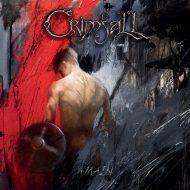 The epic diction and chorus give the immediate impression of mediaeval scenes and heroic deeds. This isn’t a false impression as everything about this work from Finland’s Crimfall suggests bombast and grandiosity.
The epic diction and chorus give the immediate impression of mediaeval scenes and heroic deeds. This isn’t a false impression as everything about this work from Finland’s Crimfall suggests bombast and grandiosity.
Crimfall use a number of tools to shape this battle-scarred epic Viking adventure. Symphonic sounds creating atmosphere transform into sounds of power metal, while vocally roars mix with delicate and heavenly female vocals, and lofty choruses. The power metal subsides momentarily as the four part “Ten Winters Apart” launches with a solemn atmosphere and the spoken word, before breaking into an expansive soundscape featuring the range of vocals and a rousing chorus. The double picking of the power metal guitar is evident before the fire expands again. It’s hard not to use the word “epic” constantly. “Part 2 – Song of Mourn” starts with an emotive plea from the lady. A guitar solo kicks in, and we return to the lady. There’s nothing wrong with this, and I can see that Crimfall are true, both instrumentally and vocally, to their epic theme, but this just wasn’t setting me on fire. “Part 3 – Sunder the Seventh” had plenty of symphonic metal pomp but the clean vocals at the start didn’t sound right. It’s kind of Therion meeting Trail of Tears. Part 3 is the prelude for the dark power metal “Part 4 – Dawn Without a Sun”. This quartet didn’t greatly uplift me but the style was uniform and did match in spirit the grandiosity and mystery that clearly this album is supposed to present.
The mystical style starting to “Mother of Unbelievers” showed great promise. It develops into a very heavy progressive power metal romp. It’s the best and most powerful track on the album so far, I thought. The dark symphony and the evocative vocals, which could have gone horribly wrong, maintain the strong momentum. A trumpet-acoustic combination introduces “It’s a Long Road”, but after that a rather dreary and unoriginal power ballad is offered up. Mid-way it reverts to a more up tempo raucous growl before toning down and back up with a dark chorus. By the end I didn’t know what I was listening to. This was a long four minutes. As if to cover all ethnic angles, “Wayward Verities” starts with a bit of yoiking, but once again it’s a foil for the main event, which is lively and jolly and folksy in parts. But the clouds thicken, the lady sings briefly, and we enter a thunderous world. I liked “Wayward Verities”. It has life and character. A sinister wind flows through “Until Falls the Rain”. The drum beats ominously. Dramatic voices are heard. It takes a while to build up the epic tension, two minutes in fact, and away we go. But it stops. The lady sings angelically, contrasting with the dark and growly expanse. “Like Mother of Unbelievers” before it, there’s real power and purpose in “Until Falls the Rain”. An eastern-ethnic-Viking section finds its way nicely into the song to add to the flavour before a truly climactic finish, with the heaviness balanced by the harmony from the lady in the background.
I liked some of this album and its combination of flavours, but all the bombast meant that overall this didn’t do so much for me. I thought the excess of striving for dramatic effect in great parts of this album took away the passion. I’m sure that more dedicated lovers of epic and emotional power metal will appreciate “Amain” more than I did.
(6/10 Andrew Doherty)

Leave a Reply